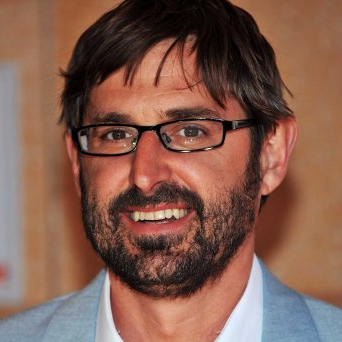Louis Theroux on stage: Live show is a wonderful experiment
Louis Theroux's stage tour is unusual and fascinating, much like the journalist and documentary maker himself.

http://gty.im/492682742
Louis Theroux at the opening of his film My Scientology Movie.
By DIANA HODGETTS
It must be strange to be Louis Theroux. The 46-year-old TV journalist is famous enough to tour Australia.
On the other hand, he opened his first Melbourne show last weekend with clips of himself asking people on the streets of Melbourne if they recognised him. Many did not. But those who did were excited to see him, in the same way ABC intern Stephanie Garnaut did in Perth last week.
It must be strange for him to share these interactions to a full house of people who paid good money to see him. But then, exploring strange perspectives and ideas is what audiences have come to expect of him.
Over the course of his live shows, he talks to guest host Julia Zemiro how his work evolved from the comically orientated 1994 series Weird Weekends to his more nuanced BBC Two specials such as Extreme Love and Louis and the Brothel.
“In the early days, I thought it was kind of funny to say ‘Well, show me where these aliens are, because I can’t see them',” he said, referring to an episode of Weird Weekends in which he interviewed the Rev Robert Short, who believed he could channel an alien.
Over time, he was struck by how ordinary the interactions he had with people on the fringes of society were.
http://gty.im/145399881
Louis Theroux interacts with his audience, honing his sharp interviewing skills as he goes.
He describes interviewing a white separatist, who interrupted an anti-Semitic rant to tell him how much he enjoyed the 1970s comedy Are you being served?
“He was reaching out to me,” Theroux said.
The realisation that somebody Theroux disagreed with on such a fundamental level would still seek a human connection with him has come to define his work.
This is a point Theroux came back to several times over the course of the show, as he and Zemiro reflected on some of his more memorable interviews. Theroux laughed a little as he watches himself recoil during an interview with a skinhead who asked him if he was Jewish.
“At the time, I thought I handled that quite well,” he said. “But you see me grip the chair there.”
Combining a Q&A session with elements of theatre, stand-up comedy and film, Louis Theroux Live on stage had an experimental feel to it. This worked best when Zemiro and Theroux reflect on Theroux’s work.
Theroux takes the opportunity to expand on interviews and stories with detail that might have been difficult to capture on camera, or been lost in the edit. When the focus is on Theroux’s work and his process, it’s very engaging. When the spotlight turns on Theroux himself though, it is less so, through no fault of his own.
The show includes a sequence of interviews with Theroux’s wife, mother, producer and nanny. Although this is an attempt to help the audience get to know Theroux, it feels out of place.
Theroux has already shown himself in very intimate situations over the course of his career. His audience already knows a version of him. It just seemed too fabricated for a man who has built his career on authenticity.
At another point, Theroux takes the microphone from Zemiro and ventures out into the audience to demonstrate his interview technique. Even for a seasoned interviewer like Theroux, this is a risky move. The entertainment value of this depends on how interesting the people he chooses at random from the audience are.
Although Theroux has a great sense of humour and even produces funny work, he is not a comedian and had very little to work with when he chose an electrician. Theroux’s genius is in revealing the humanity and vulnerability in unlikely places, as he said at the beginning of the show.
To demonstrate his interviewing technique live setting, he needed interviewees whose humanity was less evident on the surface, as it often is in Theroux’s documentaries. On this occasion, the interviews weren’t fruitful, but Theroux pushed through.
Although these parts of the show slowed the pace a little, Louis Theroux: Live on stage was by no means a failed experiment.
http://gty.im/479058884
Theroux has a remarkable talent for exploring unusual viewpoints.
The highlight was Theroux narrating over footage from When Louis Met Jimmy. Years after the documentary of Theroux meeting his childhood hero, Jimmy Saville was made, Saville was revealed to be a sex offender.
Theroux talked about re-watching his interviews with Saville after the allegations were confirmed.
“It’s tempting to see signs everywhere,” said Theroux. “But what’s most striking to me is how ordinary our interactions were.”
Theroux had the opportunity to talk to Saville about the rumours while making the documentary. At that point, Saville was still in a position to deny everything.
Theroux opened up about his regret.
“I carry the Jimmy Saville story with me,” he said. “I feel as though I failed to unmask him entirely.”
From there Theroux takes the audience through more positive career moments.
Over the past 20 years, he has interviewed prostitutes, Nazis, swingers and people with terminally illnesses, striving to find their common humanity and share it with the world.
He couldn’t tell us what he was planning on doing next, so Zemiro read him some suggestions from the audience.
“Refugees?” she asked.
Theroux did not rule it out. “It’s an important issue,” he said.
“You’d need to get the angle right.”
Louis Theroux: Live on stage continues its run in Adelaide (Friday night) and Brisbane (Saturday) this week, with the final performance in Sydney on October 2.





